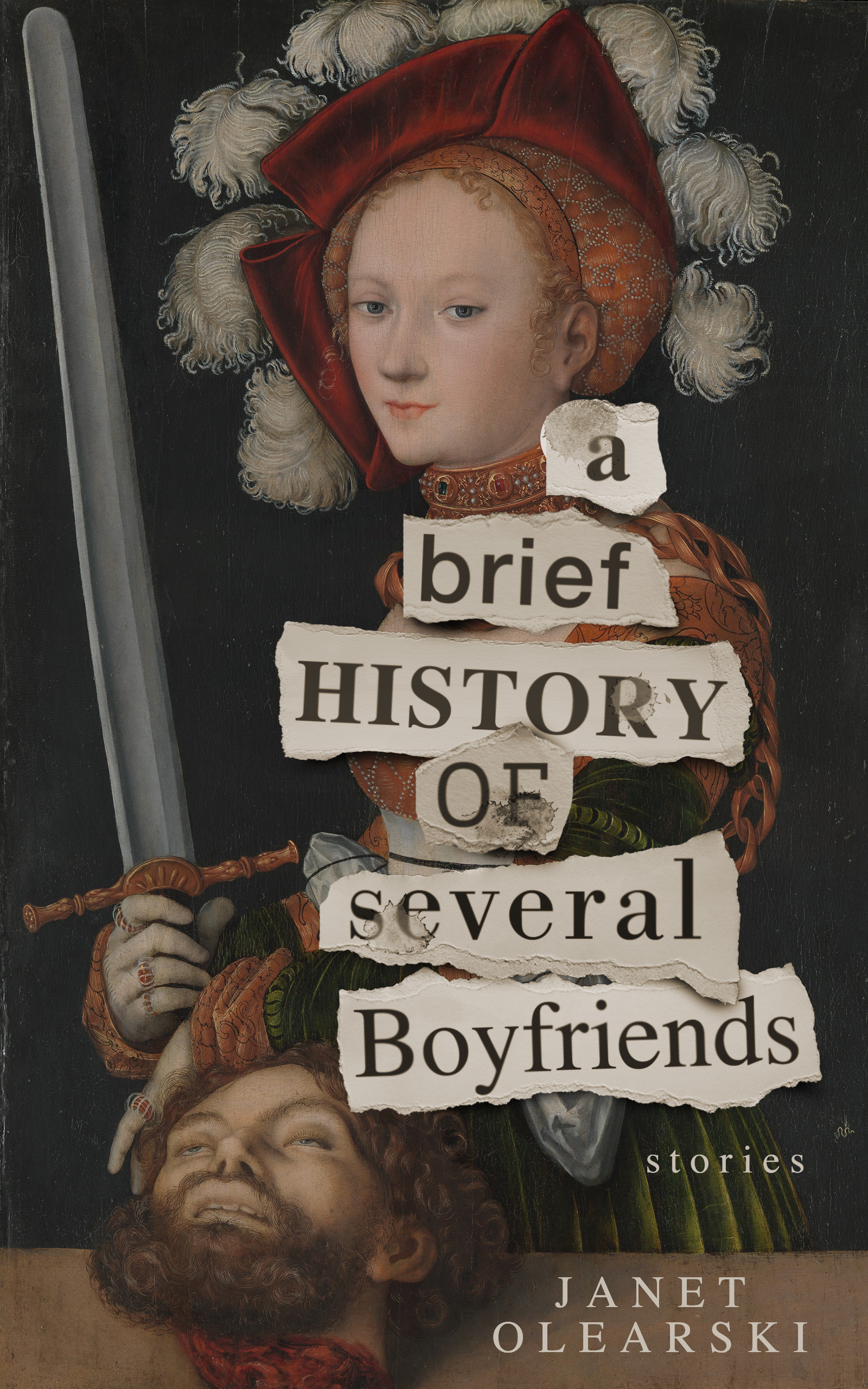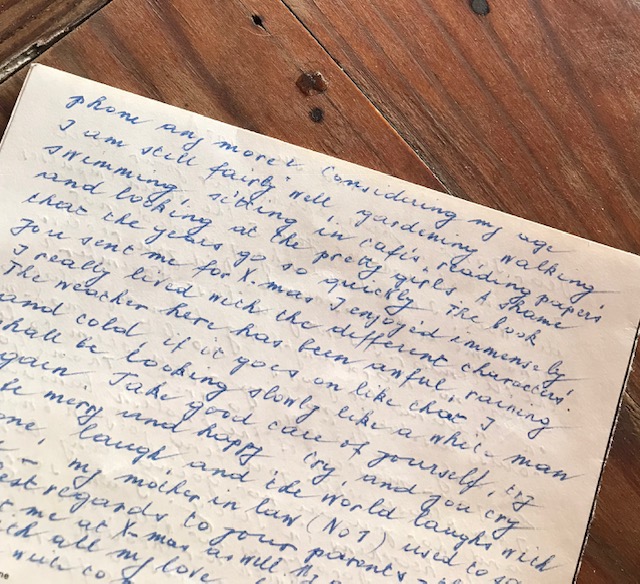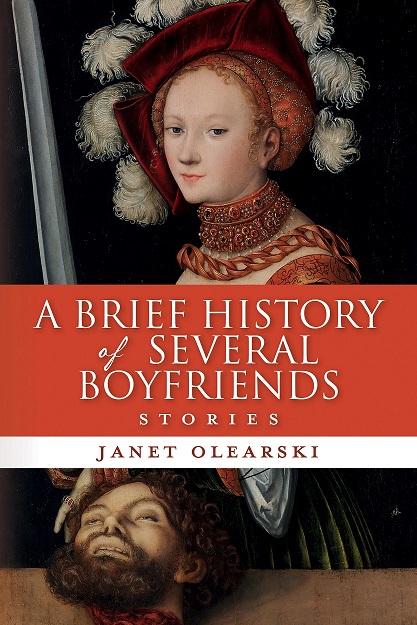By Janet Olearski

She was the older, short-haired female. A rather aggressive species, he thought. Older, and therefore experienced. It was fearsome for him to consider – and so he did not – the lives she had lived, might have lived, lives she had enjoyed and destroyed, the wiliness of her moves directed by her knowledge of things past and carried forward now into the future.
He had spotted her from afar, blue-winged and scarlet in her habitat, a high-flying estuary bird of a kind he had rarely observed before.
He should have known better. The older, short-haired female is not to be meddled with. Not by the likes of him. She fluttered seductively in men’s paths, knowing what she knew and applying it to her advantage. Unlike the past, when she had applied it to her disadvantage. For she had once been the prey of man. Easy prey. But then she was the younger, long-haired female, a delicate, pale creature, verging on the anorexic, easy to have, easy to please, easy to leave and take another.
Now she was a more evolved specimen, not as sleek perhaps, weathered – maybe hardened – possibly, but also, and resoundingly, magnetic, compulsive, charismatic, alluring, luring the helpless man-beast to her nest, entrapping and entangling the hopeless, hapless male in his inevitable flight towards an undefined fulfilment. But with one certainty: that once ensnared, he was never to escape. As surely as the sparrow hawk preyed on smaller birds, who ate the grubs in the earth, who ate the nutrients of the soil, the older, short-haired female played her part in the chain of man’s downfall, but perhaps also his redemption.
She sits at a mirror, a distant captive behind the wrought iron bars of her balcony. He watches her, captivated. She lifts her brush and pulls it carefully through glistening plumage. She turns her face this way and that, staring into her reflection. He experiences a private ecstasy, reserved for secret observers. Viewing her in silence, his home a hide with slits and peep holes, his home a hive of excited anticipation, as her robe floats feather-like to the carpet, he knows he must have her. And, when her silhouette slips from view, his hand caresses the curved inanimate surfaces of stolen eggs on the rich polished wood of the dresser in his bedroom, and he believes himself all powerful, a licensed thief of nature.
You must not move about or make a noise.
This is not conducive to the intimate study of birds.
It is a long-term project. He observes her habits, notes her displays. He knows little of her mating patterns, but he waits. He prepares himself for her broody promiscuity, knowing that it will disappoint him. Such is the species, but his is a scientific approach. He always bases action on careful research. When action is necessary, he takes it.
He passes her on the stairs. She looks at him, but does not see. He nods his head in acknowledgement. Her coat brushes his. She is there and, with a faint rustle, she is gone. He hears the door close behind her.
A case history. He watches and takes note. She is totally self-centred, an arrogant, intimidating creature. All the more intriguing for this. He observes. She preens herself with conviction and commitment.
You must always take care to keep your distance.
She is in her kitchen. She takes something from a cupboard. She turns her head and inclines it, as if listening. She stands immobile. She moves to the window. She pulls down the blind.
You, of all people, must comprehend the problems facing wild birds, the threats to their environment, the violation of their natural habitats.
Field observation. She is unlocking her car. She looks up as he passes. He would like to see her at close hand. He needs to know what she is like, her behaviour. The older, short-haired female always stands her ground. She stares you right in the eye. He lowers his eyes and moves on.
There are many ways to attract wild birds, but these methods cannot
be relied upon. Frequently birds are heard but not seen.
As you must certainly know, they often appear when least expected.
He stands behind the door in the darkness of his hall. There is a circular marking of light around his eye. He watches her through his spy hole as she waits for his response to her call. He notes her restlessness and this gives him pleasure. She rings the bell, but he does not answer. He knows she will return. She will come closer and closer… until she is close enough to touch. He will wait and watch. He knows his chance will come.
‘I live across the courtyard,’ she tells him.
‘Ah, yes,’ he says.
‘I wondered if I might…’
‘Of course,’ he says.
Good fortune and a rapport with birds have brought her to him. He is masterful with birds. Silently he listens as she reports the fault from the phone in his study.
You believe in conservation. Beware. The conservation of memory and desire belongs only to human-kind. It is folly to seek in others what you find in yourself.
‘Your glove,’ he says.
‘I never missed it,’ she tells him. What she loses – or has lost – is of no consequence to her.
Yes, he will accept a drink.
He stands in her living room. He has never seen this room before. It is not within his range.
The bird is an unpredictable creature. You cannot be sure how it may react
when threatened. Take care not to alarm it.
Her flight is late.
‘I hope you won’t think me rude,’ he says, as he stands in her doorway. ‘I’ve cooked enough for two.’
He has always shown a concern for the protection and welfare of the wild bird.
She is glad of the offer.
The light is dimmed. She perches on a stool in his kitchen. She pecks at her food, watching him. He offers her food from his own plate. Just a taste. If she will.
She will.
She grasps his hand in hers. Her nails are long and polished. She takes the food with her teeth and tongue. She is lit by the candlelight. Her eyes glint, her pupils wide and dark. His fingertips stretch towards the transparent down of eyebrows, and then to the soft pink of her lips.
‘I have her,’ he thinks. ‘I have… her.’
And one, or the other, is captivated.
He wakes in the half-light of the morning. There is a distant electric dawn. She is an early bird, humming as she splashes under his shower. He hears her voice and closes his eyes. He feels her presence in the room, an emperor and his nightingale. She rustles close by. In his dream, he turns to watch her as she bends towards the telescope. She speaks softly.
‘A perfect view,’ she says, ‘perfect,’ and her words dissolve into melodious, singing laughter. He smiles in his sleep.
Light floods his room. On the floor there is crushed eggshell, but it hardly matters. He views her through his binoculars and knows she will see him. Is this wise? She is speaking on the phone. She turns, catches sight and waves to him. She is smiling. He waves back. He is, of course, a tamer of wild birds.
‘I’ll be away. A day or two,’ she says when he calls.
‘I’ll miss you,’ he says.
‘I’ll miss you too.’
Generally, birds do not display their emotions.
He knows this, but he has forgotten.
‘I’ll call you,’ she tells him. ‘Or you call me.’
He goes about his business. Common birds are dots in the distance, looking dark and colourless. They hardly interest him. She is his obsession now. He is aware that the migratory bird is at risk abroad and this troubles him. At his office he waits to be called, but his phone is silent. He calls her.
‘You’re back,’ he says.
Yes, she’s back.
Perhaps his feeling for birds has failed him.
But she is joyful. She longs to be with him. She says.
‘We’ll see each other soon,’ she says. ‘Call me. Any time. Day or night.’
These creatures come and go airily. They snatch what they can. They are erratic. They flit here and there. They swoop, they steal, they mislead. They are elusive. They soar out of reach. They abandon you.
Being an expert in the field does not equip you to manage it.
You have been, and were intended to be, an observer, not a participator.
He trains his telescope on her windows. Her shutters are closed.
He calls her. The answering machine engages, and he hears her voice. The sullen, serious voice of the older, short-haired female.
‘Leave a message,’ the voice tells him.
Leave a thought, an aspiration, a fear? He cannot abide his words gliding on this limbo of airways.
You must surely remember the raptors. There is a link through time, forgotten
or ignored as desires replace wisdom, as greed cancels caution.
When handling predators, you must mind the talons.
He thinks on these matters as he waits, illuminated only by his hallway’s prehistoric glow. Across the courtyard, her shutters open. It takes him by surprise. He focuses the lenses. She faces him directly. Her arm is raised. She is pointing, identifying him to others – to the men standing by her side. Waiting to spot him.
And then comes the moment when, in its impotence, as beating wings descend,
the prey is paralysed by the cognizance of its fate.

‘The Older Short-Haired Female’ first appeared in Bare Fiction Magazine, April 2014.










 Oneday
Oneday
 In some distant country, in the back of beyond, when Christina stood pushing her postcards into an empty metal post box, hearing them clatter onto its hollow floor, she remembered Sonia. Sonia flitted into her mind like a soul without a home.
In some distant country, in the back of beyond, when Christina stood pushing her postcards into an empty metal post box, hearing them clatter onto its hollow floor, she remembered Sonia. Sonia flitted into her mind like a soul without a home. ***
***



